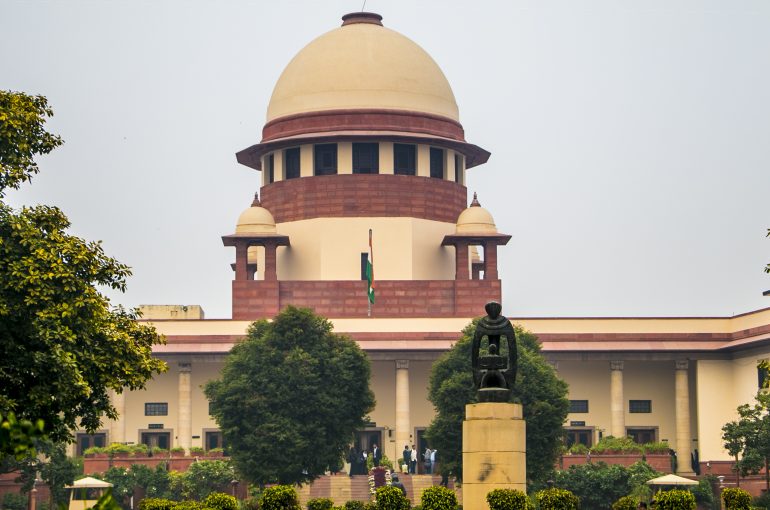SUPREME COURT HOLDS CONTENT OF DEED GOVERNS STAMP DUTY OVER NOMENCLATURE

The Supreme Court of India delivered a significant Judgment on October 8, 2025, in M/s Godwin Construction Pvt. Ltd. v. Commissioner, Meerut Division & Anr. (S.L.P. (CIVIL) No. 36434 of 2014), reaffirming a crucial precedent in stamp duty law. The Two-Judge bench of Justice Prashant Kumar Mishra and Justice Ahsanuddin Amanullah clarified that the content and legal effect of an instrument, rather than its nomenclature, determines the applicable stamp duty classification.
Factual Background of the Case
The dispute arose from two connected appeals involving similar legal questions regarding stamp duty classification under the Indian Stamp Act, 1899.
i.The Godwin Construction Case
M/s Godwin Construction Pvt. Ltd. executed a “Security Bond cum Mortgage Deed” on December 19, 2006, in favor of the Meerut Development Authority (MDA) to secure obligations related to developing “Global City” colony in Abdullahpur, Meerut. The Company mortgaged specific plots totalling 2,934.45 square meters to secure performance of development obligations worth ₹1,00,44,000. The Appellant paid stamp duty of ₹100 under Article 57 of Schedule 1-B, treating the instrument as a security bond.
However, revenue authorities determined that the document constituted a mortgage deed chargeable under Article 40, demanding additional stamp duty of ₹4,61,660 along with penalty and interest. The Company’s multiple appeals before stamp authorities and the Allahabad High Court were dismissed, leading to the Supreme Court challenge.
ii.The Banking Transaction Case
The second Appeal involved a business loan of ₹1,66,00,000 from Allahabad Bank, secured by a “Security Bond or Mortgage Deed” executed on ₹100 stamp paper under Article 57. Similar to the first case, authorities classified it as a mortgage deed under Article 40, resulting in a stamp duty deficit demand of ₹1,37,500.
Court’s Decision and Analysis
The Content Over Form Principle
The Court reiterated the fundamental principle that “in matters of stamp duty, the decisive factor is not the nomenclature assigned to the instrument, but the content of rights and obligations it embodies”. This approach requires courts to examine the actual legal character of instruments beyond their titles or designations.
Examination of Instrument Contents
The Court meticulously analysed the operative clauses of the “Security Bond cum Mortgage Deed,” noting that it explicitly stated the transfer of “all their interests in the property detailed in the schedule here to with intent that the same shall remain and be charged by way of mortgage”. The Deed also empowered the MDA to sell mortgaged properties upon default to recover dues.
Tripartite Requirement for Article 57
A crucial finding involved the interpretation of Article 57’s[ Reproduce article 57] scope. The Court held that Article 57 applies only when executed by a surety – a third party distinct from the principal debtor. The Court emphasized that “a contract of guarantee is inherently tripartite, consisting of the surety, principal debtor and a creditor”.
Since Godwin Construction executed the deed through its director on behalf of the Company itself (not as a third-party surety), Article 57 was held inapplicable. The Court clarified that “where the principal debtor itself executes a deed mortgaging its own property, Article 57 is inapplicable”.
Key Legal Principles Established
1. True Character Determines Classification
The Judgment reinforces that stamp duty liability depends on the actual legal nature of the transaction rather than nomenclature used by parties. This prevents attempts to evade higher stamp duties through misleading document titles.
2. Strict Interpretation of Surety Requirements
The Court applied Section 126 of the Indian Contract Act, 1872, requiring a genuine tripartite relationship for guarantee contracts. A company acting through its directors cannot be considered a surety for its own obligations.
3. Content Over Form in Revenue Matters
The decision extends the established principle that courts must look beyond document form to determine actual legal content in revenue cases. This aligns with broader jurisprudential trends emphasizing economic reality over legal formalism.
Conclusion
This Judgment clarifies that content governs over form in stamp duty classification. By requiring examination of actual legal rights and obligations rather than document titles, the Judgment prevents manipulative practices while ensuring appropriate revenue collection. The decision further strengthens the interpretation of Article 57’s tripartite requirement, clarifying that genuine surety arrangements require distinct third-party involvement. This provides much-needed clarity for businesses, legal practitioners and revenue authorities dealing with security instruments and guarantee arrangements.
Going forward, parties must ensure that their transaction documentation accurately reflects the legal content of their arrangements, as nomenclature will not shield them from appropriate stamp duty obligations.
YASH HARI DIXIT
Legal Associate
The Indian Lawyer & Allied Services
Please log onto our YouTube channel, The Indian Lawyer Legal Tips, to learn about various aspects of the law. Our latest Video titled “Legal Aspects of Startup Funding in India | Complete Guide 2025 | Advocate Sushila Ram Varma” can be viewed at the Link below:





































Leave a Reply